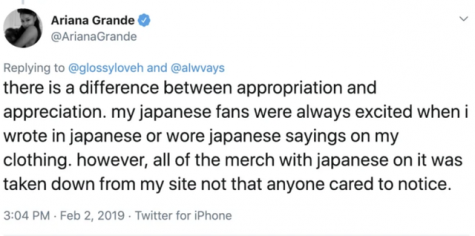Grande’s “7 rings” music video, tattoo more appropriation than appreciation
No one can seem to stop talking about Ariana Grande. Grande released her chart topping album “Sweetener” in August. Grande excited fans again with consecutive chart topping singles “thank u, next” and “7 rings.” Then she released a complete album called “7 rings” just six months after “Sweetener.” To honor her new album, Grande attempted to tattoo “7 rings” in Japanese across her palm, but ended up with permanent ink that read “small, charcoal grill.” Aside from this obvious error, people expressed frustration with her continued use of Japanese culture.
Critics took to Twitter, Instagram, and any other form of social media to bash the singer for cultural appropriation in her “7 rings” music video. This isn’t the first time Grande has been critiqued for appropriation, and people are quick to point out her skin tone which has gotten significantly darker since she first rose to fame.
Cultural appreciation is when you use culture and honor and acknowledging the source they came from ( idol) appropriation is the taking of elements of one culture by someone of another culture (7 rings). the line is tricky tho
— namarcus (@seokjinsdurag_) February 17, 2019
Is there a gray area regarding cultural appropriation versus cultural appreciation? Costumes depicting groups of people, and governors and senators painting their faces with shoe polish to dress as black people is widely recognized as cultural appropriation. Trying foods from different cultures, and respecting and observing cultural practices with an invitation is conversely viewed as cultural appreciation. But the line gets a bit more fuzzy when considering cases like the “7 rings” video and the Japanese tattoo.

Grande isn’t pretending to be Japanese or poking fun at the culture, but it’s still rubbing people the wrong way. It’s not appreciation either, because she doesn’t acknowledge the video to be a tribute to the culture, or seem to care about getting the pieces right.
Qualities like larger lips, hair extensions, darkened skin, and tattoos in characters are becoming very trendy, but what does that mean for people whose cultures they belong to? This is where the frustration comes into play with Ariana Grande. While she is not mocking the cultures, it is frustrating to see her praised for qualities that have been used to marginalize people of color. And even though Grande isn’t technically doing anything wrong, she could be doing better.
Every fan needs to stop making excuses for your fave and understand why so many black and brown people were offended by 7 rings. Exploitative cultural appropriation IS real and it's harmful to the oppressed groups being stolen from.https://t.co/soG3MejuNM
— Appropriana (@appropriana) February 18, 2019
To appreciate is to acknowledge where the tradition originates and the culture it’s part of. Someone with such a large and widespread fan base, like Ariana Grande, could make a powerful statement by acknowledging that her video is inspired by Japanese culture. And while the chart topper is by no means appropriating the culture, she could help to fight against racial prejudices and the marginalization of people of color by publicly recognizing the source of her inspiration.
Ellie Nowakowski is the Executive producer of Rubicon TV. This is her fourth year on staff. She appreciates how journalism has the power to inform and...